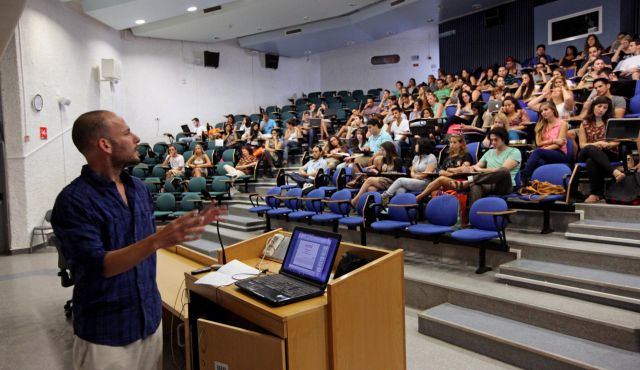PMO and national student union to create covert units at universities to engage in diplomacy via social media; unit heads to receive full scholarships
Barak Ravid
Haaretz
August 14, 2013
The Prime Minister’s Office is planning to form, in collaboration with the National Union of Israeli Students, “covert units” within Israel’s seven universities that will engage in online public diplomacy (hasbara).
The students participating in the project, who would post on social media networks such as Facebook and Twitter on Israel’s behalf, will be part of the public diplomacy arm of the PMO, but would not identify themselves as official government representatives.
About a week ago, the outgoing deputy-director general of the Public Diplomacy and Diaspora Affairs Ministry, Daniel Seaman, sent a document to the government tender committee seeking to exempt the national student union from being chosen as the partner in the project through a public bidding process.
The PMO is looking to invest close to NIS 3 million to recruit, organize and fund the activities of hundreds of university students, as part of the country’s public diplomacy effort.
The Public Diplomacy Ministry is being closed and its staff are being integrated into the national public diplomacy unit in the Prime Minister’s Office. Seaman, who previously served as head of the Government Press Office and also ran as a candidate in the Likud party primaries, is expected to assume a new position shortly – that of head of an office with the very official sounding name of “the interactive media unit.” In practice, this is the entity that is expected to coordinate the public diplomacy efforts of the Prime Minister’s Office on the Internet and social networks.
Seaman informed the public tender committee that the Prime Minister’s Office was interested in having the student union recruit up to 550 students with knowledge of foreign languages from Israel’s seven universities. The student union is to publicize the project among tens of thousands of students and be responsible for the screening process, which will include submission of resumes, submitting answers to questionnaires, providing translation samples and participating in individual interviews. It is also the student union that is to provide computers and work space for a project headquarters on each campus.
Seaman informed the committee that the diplomacy units at each university would take direction from staff at the Prime Minister’s Office, but its public face would be one of an independent student entity. “The entire idea of the setup is based on activity of students and by students,” Seaman wrote to the committee. “The idea requires that the state’s role not be highlighted and therefore it is necessary to insist on major involvement by the students themselves without any political link [or] affiliation.”
It is apparent from Seaman’s document that a diplomacy group will be set up at each university and structured in a semi-military fashion. The head of the unit will be a student “senior coordinator,” who will receive a full scholarship from the Prime Minister’s Office. Working under the senior coordinator will be three other student coordinators, each of whom will head one of three desks, responsible for languages, graphics and research. These coordinators will get smaller scholarships. A group of student activists, who will receive nominal student stipends, will work under each coordinator. The Prime Minister’s Office will fund a total of NIS 2.78 million in scholarships for the program in the upcoming academic year.

